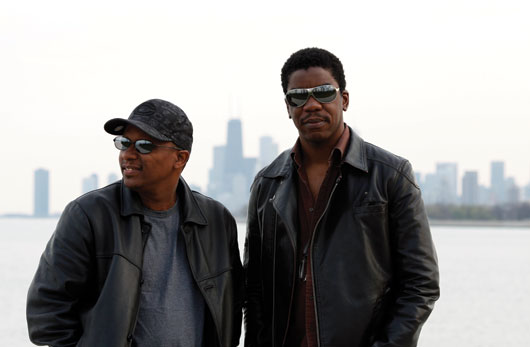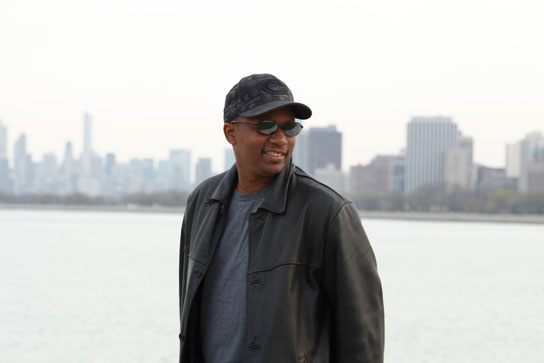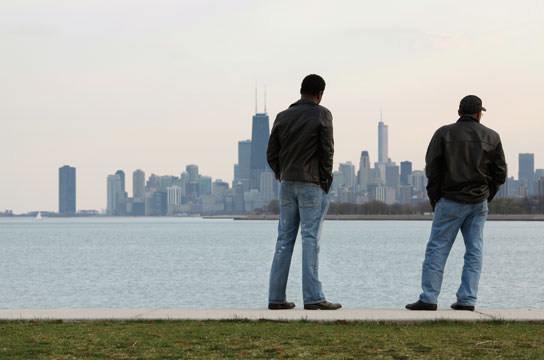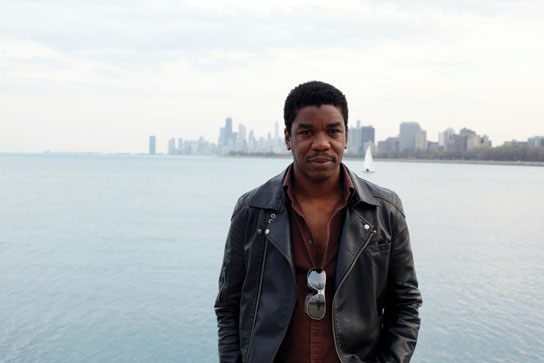House Arrest: The Juan MacLean Quizzes Virgo’s Merwyn Sanders About Chicago’s Glory Days.
Twenty-plus years after the original release of their seminal self-titled album, Chicago house pioneers Virgo […]

House Arrest: The Juan MacLean Quizzes Virgo’s Merwyn Sanders About Chicago’s Glory Days.
Twenty-plus years after the original release of their seminal self-titled album, Chicago house pioneers Virgo […]

Twenty-plus years after the original release of their seminal self-titled album, Chicago house pioneers Virgo are seeing their masterwork reissued and receiving a whole new round of praise in the process. The Juan MacLean (a.k.a. New Yorker John MacLean) got on the phone with Virgo‘s Merwyn Sanders to discuss the group’s history and learn a little more about the golden era of Chicago house music.
Jaun MacLean: Are you surprised at how often you are referenced as a touchstone, a pioneering group for people making house music today?
Merwyn Sanders: We’re really surprised. I mean, it’s been 20 years and we really haven’t heard anything. The only thing is once in a while I call Gramaphone Records in Chicago to ask if they have Virgo Four in the racks, and they say, “yeah.” But that’s about it. Otherwise, we had no clue.
It’s funny because in my world, you guys, and a lot of your contemporaries, are held in incredibly high regard. Are you aware of how much respect or acknowledgment you get in Europe compared to the United States?
What I can say is whatever awareness there seems to be is all from Europe. We’re not aware of any here. Especially in our hometown, Chicago. And the only way we found that out is through our publishing, you know, where it’s being played. I’ve run into some DJs from over there during the last 20 years who told me they have our records. But it’s only been like two or three people.

Eric Lewis
How active have you been over the last 20 years?
Oh, Eric [Lewis] and I actually never stopped making music. We made a lot of music back then [for the Trax label], but we didn’t venture out to another label. I wanted to get something out on Strictly Rhythm. I was a big fan of that label. But it was the same thing we heard everywhere: “Not our cup of tea.” Larry [Sherman, co-founder of Trax] was our only avenue to go, and we were kinda cool with him personally, but even he didn’t put out everything we gave him. Our catalog is around 24 tracks. And that’s not including the stuff we didn’t give him.
What about now? Are you still working on tracks?
Oh, yeah. We’ve done so much alone and every now and then we get together. We’ve been doing the music ever since. Actually, I did one release four years ago, something called “Elevator House Music,” that they put on a compilation called Twilight Trax.
I don’t know if you’re familiar with the label I’m on, DFA, which sort of bridges the gap between indie rock and dance music…
I only heard of it recently, yeah…
The old-school Chicago sound gets referenced a lot, and just as an aside, I bet if you send stuff to DFA they might be interested in doing something with you. But I also wanted to ask you how much your production technique has changed from 20 years ago, how much you’ve gotten into computers. Your really early stuff doesn’t sound like it was made with a sequencer. Parts of it had a much looser feel, like it was actually played by hand. I was wondering if that was true.
Yeah, that’s totally true. We didn’t even have a sequencer! The parts that seemed sequenced were just triggered by a drum machine. Everything else was just played. We were just talking about that, which is funny, because everything now is digital and done on your laptop or desktop or whatever. It’s been kind of a transition for us because we’re used to getting a piece of gear, you know, turning it on, getting a pad, tweaking it a bit, and playing it. Back in the day, we would play the whole length it needed to be. So if it was like five, six minutes, we’d play the whole thing. Now, of course, you can play it for a quick two seconds and just loop it a bunch of times. But it takes something away from the track.
Virgo – “Take Me Higher” (1989)
Dance music got away from what you’re talking about, everything just got really synthetic and locked down. What people are responding to with you guys is that looser feel, even if they don’t know why they are responding to it.
We still do it the same way, but we also do it the other way now. It depends on the track and how it starts and develops. The other day we were messing around, just me playing something on the guitar, Eric playing something on the keyboard, whatever is happening in the moment. We started out as musicians in a band, not as DJs, who also did house music.
I always wondered if artists like you guys were trying to have mainstream success, to get your songs played on the radio.
Oh, yeah! It was always one of my biggest goals. Eric and me always talked about wanting it. That’s where technology has hurt it in a way, because almost anybody with a laptop can do it now by clicking and dragging, and you can come up with a pretty good track. It sounds like everyone else’s, but it doesn’t have that feel you were talking about…
Millions of people are doing that now. But there’s also this whole other movement of people making house music, like the Toronto-based group Azari & III, which sounds a lot like you guys, making stuff like it could have been produced in Chicago 20 years ago.
Eric and I were just talking about that. We’re kinda shocked when we hear stuff like that. We knew each other and played together for 10 years before we started putting anything out. It was just what we were doing. We were unaware of any influence we might have had. It was just normal to us. But I think it’s cool that people are getting something out of it now. The way we’re working now is to develop more of the vocals, with live bass, like we did on the Virgo Four album. That’s what we did before and we want to go back to doing that.
I bet if you went to a place like London, there’d be a massive turnout for your show.
Really? I was totally unaware.

I was always curious about your name. There was also another Virgo from that time period.
That was Larry Sherman’s idea. Eric and I didn’t know anybody else on Trax. Never ran into anyone, except eventually Ron Hardy. The first Virgo records [that featured Marshall Jefferson, Adonis Smith, and Vince Lawrence] had a certain vibe, and Larry thought we had that same vibe. He figured nobody had ever heard of us so he was going to put “Virgo” on it but add “Four” because it was the fourth album of that type of music. So that’s how we ended up being called Virgo Four. You know, we both were against it. I threw more of a fit than Eric, who was more laid back about it. I was the one always arguing with Larry. But that’s how he split it up as, you know, an unspoken deal to put some name recognition on the tracks. So we were both recording as Virgo at the same time. That’s the story behind that.
Was there a cohesive scene back then, and were you guys into it or outside of it? People now can imagine you guys hanging out at the Warehouse on a Friday night.
Oh, yeah, we were doing that. Eric and me and our other friends would be at the Warehouse, the Playground, the Music Box, the Power Plant with Frankie Knuckles… I remember the first time we went to the Power Plant we weren’t old enough. The guy at the door asked us how old we were and I tell him my real age and he says, “Sorry, you guys can’t get in.” I don’t know why I didn’t lie to get in for the first time. I’ll never forget that. But, yeah, we were part of the club scene and we also went to the dance parties at Mendel Catholic Prep, where Eric went to high school. That was another big hotspot for house parties.
What was the vibe like at the parties in Chicago back then?
Oh, wow. It’s hard to put into words because no club now is like Chicago was back then. Imagine everybody going to the club for the music, and just for each other. They wanted to hear what Ron Hardy or Frankie were going to be playing that night. Even if you didn’t dance you just wanted to hear what was going to be played. I mean, this was at a time when you had people bringing tape recorders to the parties, because they wanted to get one of their mixes. There’s no vibe going on like that right now, as far as I know.
No…
It was a whole different culture that we were a part of. I’ll give you a quick example: The Music Box was literally a box. It had these enormous speakers in it, so the music was so loud you couldn’t talk, there were no fancy lights except for maybe a strobe light they turned on every now and then. And they might have served only Kool-Aid, I can’t remember. But you didn’t even want to drink, you just wanted to hear the next track Hardy was gonna play. It was only about the music going on and about hanging out—that was the vibe. I remember a few people having sex on the floor or something, but it was so dark and loud that nobody would be paying any attention and they wouldn’t care.

Merwyn Saunders
I DJ a lot all over the world and it seems like what it’s turned into now is the night starts out really slow and the people basically have to get wasted on alcohol, coke, or ecstasy to start having a good time. Then it doesn’t really matter what music is playing. I always wondered how much drugs played a part back then in dance-music culture, because now the two are synonymous.
I had friends who did this or did that, but that wasn’t something Eric and I were into at all. Neither one of us drank, neither one of us smoked or did anything else. But it didn’t seem to be really a part of the scene, in general, just something a few people did. Not so much related to the club or the music, I mean, just what some people would do wherever. That’s how we looked at it. I think it was different in those days even in that sense.
I think that speaks a lot about how it was back then. I don’t drink or do any drugs at all, and when other DJs or promoters find this out there is almost this element of distrust. People can’t believe that you can be out DJing or out dancing and enjoying that atmosphere without being totally wrecked.
Exactly, I know what you mean, I get that all the time… I tell people I never smoked pot and they say, “Sure, right.” They don’t believe me! I’m a church boy. I grew up in the church and that’s always stayed with me.
It seems to come through in your music.
Definitely, you can hear some of the same chords, and a lot of the song titles come from that side of us, like “Do You Know Who You Are?” I mean, Eric and I both come from that tradition.
Virgo – “Do You Know Who You Are?” (1989)
How much attention were you paying to some of your contemporaries, like Kraftwerk, for instance?
Kraftwerk was huge with us, probably number one on the list. We also were listening to, like, Yellow Magic Orchestra…
It’s really interesting that long before the internet you would be so influenced by these guys on the other side of the world from Chicago.
I used to DJ and I was buying everything. With Kraftwerk, you had to get two of everything. They were electronic, but they were funky. How could you not be into it if you were into that kind of music?
They also had a huge influence on what was going on in Detroit. How much were you aware of the Detroit techno scene?
Not much at all, really. Eric and I weren’t really tapped into what was going on in Detroit or New York. We were kind of in our own world a little too much…
I actually think that helps to make something a little more original as well, because you’re not being so influenced by things going on around you. Have you guys ever played live before?
No, never. Not as Virgo Four…
Is it possible to do it now? What are your plans for the future?
Oh, yeah. We’ve been talking to Rush Hour about that, trying to get some tour dates together, figuring out different ways how a two-man group can put on a great show. It’s just a good feeling to get some appreciation for something you’ve done over 20 years later. I’m excited about it. We plan on getting the older tracks together, making some new material and releasing a bunch of stuff.
You’ve touched so many people’s lives with your music and now it’s coming back around.
Wow, it’s really nice of you to say. We’re just looking forward to keeping it going. Thanks, Juan.
Virgo’s Virgo is out now on Rush Hour. The Juan MacLean’s DJ-KiCKS is out now on !K7.
Listen to the entire interview:

